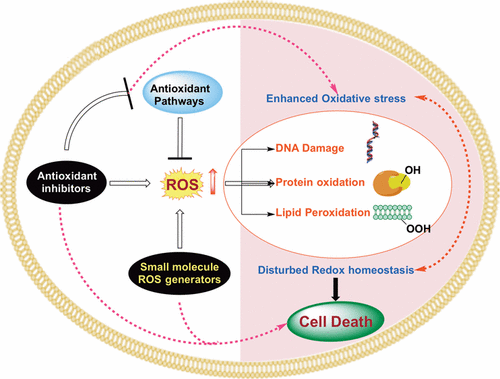当前位置:
X-MOL 学术
›
J. Med. Chem.
›
论文详情
Our official English website, www.x-mol.net, welcomes your
feedback! (Note: you will need to create a separate account there.)
Role of Reactive Oxygen Species (ROS) in Therapeutics and Drug Resistance in Cancer and Bacteria
Journal of Medicinal Chemistry ( IF 6.8 ) Pub Date : 2017-02-14 00:00:00 , DOI: 10.1021/acs.jmedchem.6b01243 Allimuthu T. Dharmaraja 1
Journal of Medicinal Chemistry ( IF 6.8 ) Pub Date : 2017-02-14 00:00:00 , DOI: 10.1021/acs.jmedchem.6b01243 Allimuthu T. Dharmaraja 1
Affiliation

|
Evading persistent drug resistance in cancer and bacteria is quintessential to restore health in humans, and impels intervention strategies. A distinct property of the cancer phenotype is enhanced glucose metabolism and oxidative stress. Reactive oxygen species (ROS) are metabolic byproducts of aerobic respiration and are responsible for maintaining redox homeostasis in cells. Redox balance and oxidative stress are orchestrated by antioxidant enzymes, reduced thiols and NADP(H) cofactors, which is critical for cancer cells survival and progression. Similarly, Escherichia coli (E. coli) and life-threatening infectious pathogens such as Staphylococcus aureus (SA) and Mycobacterium tuberculosis (Mtb) are appreciably sensitive to changes in the intracellular oxidative environment. Thus, small molecules that modulate antioxidant levels and/or enhance intracellular ROS could disturb the cellular oxidative environment and induce cell death, and hence could serve as novel therapeutics. Presented here are a collection of approaches that involve ROS modulation in cells as a strategy to target cancer and bacteria.
中文翻译:

活性氧(ROS)在癌症和细菌的治疗和耐药中的作用
在癌症和细菌中避免持久的耐药性是恢复人类健康的典型,并推动了干预策略。癌症表型的独特性质是增强的葡萄糖代谢和氧化应激。活性氧(ROS)是有氧呼吸的代谢副产物,负责维持细胞中的氧化还原稳态。氧化还原平衡和氧化应激是由抗氧化酶,减少的硫醇和NADP(H)辅助因子精心策划的,这对于癌细胞的生存和发展至关重要。同样,大肠杆菌(E. coli)和威胁生命的传染性病原体,例如金黄色葡萄球菌(SA)和结核分枝杆菌(Mtb)对细胞内氧化环境的变化非常敏感。因此,调节抗氧化剂水平和/或增强细胞内ROS的小分子可能会干扰细胞的氧化环境并诱导细胞死亡,因此可以用作新型疗法。本文介绍了一系列方法,这些方法涉及细胞中的ROS调节,以此作为靶向癌症和细菌的策略。
更新日期:2017-02-14
中文翻译:

活性氧(ROS)在癌症和细菌的治疗和耐药中的作用
在癌症和细菌中避免持久的耐药性是恢复人类健康的典型,并推动了干预策略。癌症表型的独特性质是增强的葡萄糖代谢和氧化应激。活性氧(ROS)是有氧呼吸的代谢副产物,负责维持细胞中的氧化还原稳态。氧化还原平衡和氧化应激是由抗氧化酶,减少的硫醇和NADP(H)辅助因子精心策划的,这对于癌细胞的生存和发展至关重要。同样,大肠杆菌(E. coli)和威胁生命的传染性病原体,例如金黄色葡萄球菌(SA)和结核分枝杆菌(Mtb)对细胞内氧化环境的变化非常敏感。因此,调节抗氧化剂水平和/或增强细胞内ROS的小分子可能会干扰细胞的氧化环境并诱导细胞死亡,因此可以用作新型疗法。本文介绍了一系列方法,这些方法涉及细胞中的ROS调节,以此作为靶向癌症和细菌的策略。































 京公网安备 11010802027423号
京公网安备 11010802027423号